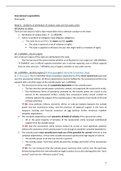International responsibility
Exam guide
Week 2 – problems of attribution of conduct: state and non-state actors
Attribution to states:
There are two ways to hold a state responsible and to attribute conduct to the state:
1. Attribution of conduct (arts. 4 – 11 ARSIWA).
2. Failure to perform an obligation (due diligence obligation).
o The state has to act if it is (1) aware and (2) capable.
• The state is aware of a risk of violation of rights.
• The state is capable to influence the acts that might lead to a violation of rights.
Art. 4 ARSIWA – de jure organs:
Acts of de jure organs of the state are attributed to the state.
- The internal law of the state provides whether an entity/person is an organ (art. 4(2) ARSIWA).
à EXAMPLE: acts in official capacity (excluded: acts in private capacity); acts in official capacity
that are ultra vires (art. 7 ARSIWA); acts of organs, whether or not under control.
Art. 4 ARSIWA – de facto organs (ICJ Nicaragua and ICJ Genocide Convention case):
In ICJ Nicaragua, the ICJ identified three cumulative requirements of the strict control test exercised
over the secessionist entities. All three requirements must be fulfilled for the secessionist entity to be
equated with a de facto organ of the outside power (art. 4 ARSIWA):
1. The secessionist entity must be completely dependent on the outside power.
o The fact that the outside power conceived, created, and organized the secessionist entity.
o The multifarious forms of assistance provided by the outside power are crucial to the
pursuit of the secessionist entity’s activity (the secessionist entity cannot conduct its
activities without the support of the outside power / the cessation of aid results in the end
of these activities).
à NB: close political, military, economic, ethnic, or cultural relations between the outside
power and the secessionist entity, and the provision of logistical support in the form of
weapons, training, and financial assistance do not (without further evidence) establish
complete dependence.
2. This complete dependence must extend to all fields of activity of the secessionist entity.
o All or the great majority of activities of the secessionist entity received multifaceted
support from the outside power.
à NB: that the secessionist entity cannot conduct its crucial or most significant activities
without the assistance of the outside power is not enough to establish complete dependence.
3. The outside power must actually have made use of the potential for control inherent in that
complete dependence: it must have actually exercised a particularly high degree of control.
o The outside power must exercise control in general.
o The outside power must have wholly devised the strategy and tactics of the secessionist
entity.
à NB: it is not necessary that the outside power exercises strict control over the particular
activity during which the internationally wrongful conduct occurs (this distinguishes the “strict
control” test from the “effective control” test).
1
, Alternative 1 – overall control test (ICTY):
In ICTY Tadic, the ICTY decided that in order to attribute the conduct of a secessionist entity to an
outside power by applying the “overall control” test, it must be proved that the outside power wields
overall control over the entity. Essentially, there are two parts to the test:
1. Provision of financial and training assistance, military equipment, and operational support.
à NB: the provision of economic, military, or other assistance, in and of itself, is not sufficient
to establish overall control
2. Participation in the organization, coordination, or planning of military operations.
à NB: it is not necessary that the outside power also plans or directs the particular operation
or activity, chooses the targets of military operations, or gives specific orders or instructions
concerning the various activities.
à NB: this test replaces the “strict control test” of the ICJ.
Alternative 2 – effective overall control test (ECtHR):
In ECtHR Loizidou v. Turkey, the ECtHR held that the conduct of the authorities of the secessionist
entity could be attributed to the state on the basis that the state exercised “effective overall control”
over the territory of the secessionist entity.
1. The outside power has a large number of troops engaged in active duties in the territory of
the secessionist entity.
o Particular emphasis is placed on the duration of the presence of the troops, their
deployment across the whole territory and the secessionist entity, and the fact that they
constantly patrolled and had checkpoints on all main lines of communication.
à NB: this test replaces the “strict control test” of the ICJ.
Art. 5 ARSIWA – conduct of persons/entities exercising elements of governmental authority:
According to art. 5 ARSIWA, an act is attributable when the entity is exercising a governmental
function. There are three requirements:
1. Exercise of elements of governmental authority (public welfare, public good, etc.) (ICSID Bosh
v. Ukraine).
2. Empowered by law (assigning certain functions to the entity).
3. In that particular capacity: it has to concern the precise act.
à EXAMPLE: acts in governmental capacity (excluded: acts in private capacity); acts that are ultra
vires (art. 7 ARSIWA).
à NB: ownership is not enough, because international law respects separate personality. The mere
fact that a corporation is owned (partially or even entirely) by a state does not automatically permit
the piercing of the corporate veil and the attribution of the conduct of the corporation to the state
(Olleson, p. 472).
2




